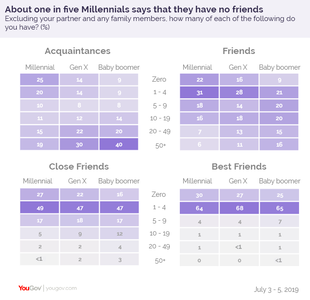For the past year, I have increasingly been fascinated/troubled with the issue of loneliness and broad social cohesion. Being lonely for a long time has been viewed (including by myself) as a personal problem, but the truth is that increasingly we live in a lonely country and that has a lot of implications on our society.
The UK has identified loneliness as a public health crisis, even naming a ministry to address the problem. Surgeon General Dr. Vivek Murthy describes loneliness as an epidemic. Some estimate that feeling lonely can have the same adverse effects on one's health as smoking regularly. Loneliness has even spilled into the political realm with people supporting candidates/causes not because they want certain policy outcomes but because they are seeking out community.
I came across this graphic the other day and it was shocking to see that 22% of millennials report having zero friends and over 50% of millennials report having less than 4 friends.

When discussing loneliness, social media and video games have often been identified as the primary culprits of this trend. Millennials spending a lot of their day behind screens and are losing the personal contact that previous generations have had. Bowling Alone by Dr. Putnam is the seminal book on this topic with Putnam citing the example of bowling leagues of how communal institutions that brought people together (churches, civic clubs) have all lost membership over the previous decades. The combination of technological changes and increased secularization of the country has definitely driven a lot of the loneliness epidemic in America and across the Western world.
I probably agree with most of these explanations as to the increase in loneliness, but I do think that one large factor is the decline of trust in social institutions and how that also contributes to our increased loneliness.
In a country where increasingly people view other citizens as threats and not friends. A country where the number 1 threat after a year of pandemic, financial hardship, and looming environmental crises was identified as our fellow citizen is a fundamentally unhealthy society. If you believe that most people are trying to screw you most of the time, it's no wonder you will find it difficult to find friends.
Yes, America needs more parks and libraries and other spaces that are public for people to spend time together. Yes, Americans need a replacement for the communities that religious groups and civic clubs traditionally used to offer.
But beyond that, unless we address the trust question, we will only grow lonelier.
The UK has identified loneliness as a public health crisis, even naming a ministry to address the problem. Surgeon General Dr. Vivek Murthy describes loneliness as an epidemic. Some estimate that feeling lonely can have the same adverse effects on one's health as smoking regularly. Loneliness has even spilled into the political realm with people supporting candidates/causes not because they want certain policy outcomes but because they are seeking out community.
I came across this graphic the other day and it was shocking to see that 22% of millennials report having zero friends and over 50% of millennials report having less than 4 friends.

When discussing loneliness, social media and video games have often been identified as the primary culprits of this trend. Millennials spending a lot of their day behind screens and are losing the personal contact that previous generations have had. Bowling Alone by Dr. Putnam is the seminal book on this topic with Putnam citing the example of bowling leagues of how communal institutions that brought people together (churches, civic clubs) have all lost membership over the previous decades. The combination of technological changes and increased secularization of the country has definitely driven a lot of the loneliness epidemic in America and across the Western world.
I probably agree with most of these explanations as to the increase in loneliness, but I do think that one large factor is the decline of trust in social institutions and how that also contributes to our increased loneliness.
In a country where increasingly people view other citizens as threats and not friends. A country where the number 1 threat after a year of pandemic, financial hardship, and looming environmental crises was identified as our fellow citizen is a fundamentally unhealthy society. If you believe that most people are trying to screw you most of the time, it's no wonder you will find it difficult to find friends.
Yes, America needs more parks and libraries and other spaces that are public for people to spend time together. Yes, Americans need a replacement for the communities that religious groups and civic clubs traditionally used to offer.
But beyond that, unless we address the trust question, we will only grow lonelier.